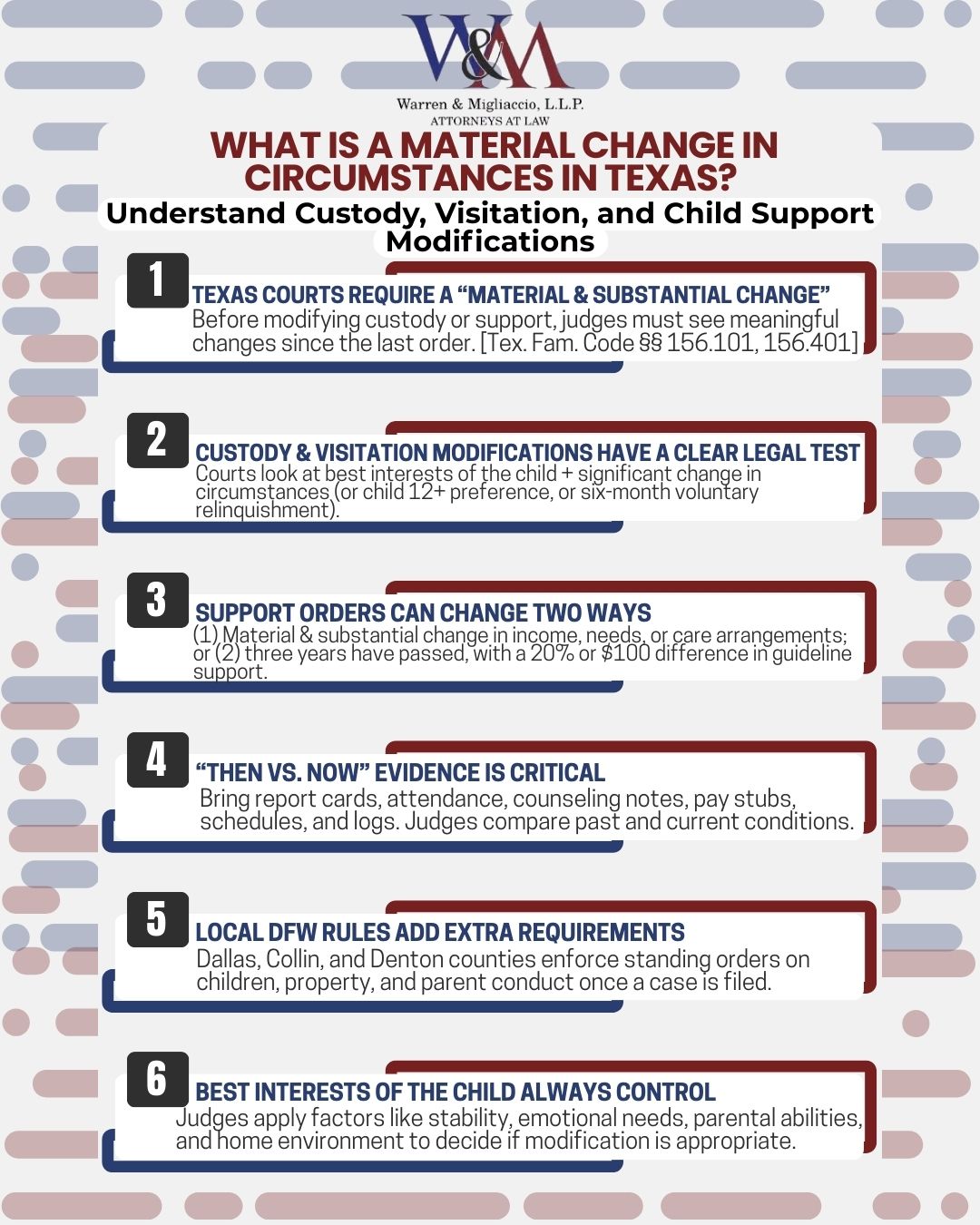In Texas, courts modify custody, visitation, or support only when life has materially and substantially changed since the last order and a change serves the child’s best interests—see Texas Family Code § 156.101 (custody) and § 156.401 (support).
When family life changes, your court order may need to change too. In Texas, courts require a material and substantial change in circumstances before modifying a custody order, visitation schedule, or child support. Our Dallas child custody attorneys help North Texas families navigate this standard with clarity and care.
Quick Answer: What counts as a material and substantial change to modify a Texas custody or child support order?
In Texas, a judge may modify custody or support only after a material, substantial post-order change (Tex. Fam. Code §§156.101, 156.401); act promptly to document “then vs. now” proof tied to best interests.
- Gather prior-and-current records (school, medical, work, exchanges).
- File a Texas modification suit in the court with continuing, exclusive jurisdiction (CEJ).
- Request temporary orders if safety, possession, or support needs are urgent.
Our family law team serves Dallas, Fort Worth, and North Texas—proudly based in Richardson and trusted across Dallas, Collin, Denton, Rockwall, and Tarrant counties. We focus on protecting what matters most: your child’s well‑being and your rights under the child custody laws in Texas. [Tex. Fam. Code § 153.002; TexasLawHelp, “Child Custody and Conservatorship.”] Texas StatutesTexas Law Help
Need-to-Know Highlights
- File in the court with continuing, exclusive jurisdiction (CEJ) unless transferred.
- Within one year of changing primary residence, a §156.102 affidavit is required.
- Win with side-by-side records (last order date vs. today), not allegations.
- Local standing orders (DFW) govern conduct—follow them from day one.
What Is a “Material and Substantial Change” Under Texas Law?
Plain-English definition.
A “material change in circumstances” means a meaningful shift in facts since the last order that affects the child or a person bound by the order. Before modifying an order, Texas courts must determine whether the change constitutes a material and substantial change in circumstances, which is context-specific and depends on the specific facts or actions involved.
Texas judges look at real-world changes and decide whether updating the custody order, visitation order, or child support order serves the child’s best interests. It is fact-specific and within the court’s discretion. [Tex. Fam. Code §§ 156.101, 156.401; Lenz v. Lenz, 79 S.W.3d 10, 19 (Tex. 2002).] Texas Statutes; FindLaw
Custody/visitation legal test (§156.101).
A court may modify conservatorship or parenting time if (1) it is in the best interests of the child and (2) the court determines there has been a material and substantial change since the prior order, and that the facts constitute a significant change; or if a child 12+ states a preference for primary custody; or if the custodial parent voluntarily relinquished primary care for six months. [Tex. Fam. Code § 156.101(a)(1)–(3); § 153.009.]Texas Statutes
Support legal test (§156.401).
A court may modify support based on (1) a material and substantial change or (2) the three‑year rule when guideline support differs by 20% or $100. To request a modification, a parent must file a petition with the court. [Tex. Fam. Code § 156.401(a), (a‑1).]Texas Statutes
Practical example.
A parent’s work shifts from nights to days (improving parenting time) while the child’s school attendance drops—together, that substantial change may justify a modification if it clearly helps the child, and the court determined the change was significant enough to warrant modification. [Tex. Fam. Code § 156.101; § 153.002.]Texas Statutes

Understanding the “Best Interests of the Child” in Texas
Statutory command. Texas law says the best interests of the child control all conservatorship and possession decisions. [Tex. Fam. Code § 153.002.]Texas Statutes
Holley v. Adams factors (Texas Supreme Court). Courts often consider these non‑exhaustive factors: the child’s desires; the child’s emotional and physical needs now and in the future; any danger to the child; each parent’s ability to meet needs; available programs; parental plans; home stability; acts/omissions; and excuses. The court’s consideration also includes the child’s financial needs and preferences. Tie your request to the top two or three that fit your facts. [Holley v. Adams, 544 S.W.2d 367, 371–72 (Tex. 1976); Texas Children’s Commission Bench Book (Best‑Interest factors).]Justia Law
Scenario. A 13‑year‑old’s grades fall and counseling notes show anxiety after repeated missed exchanges. The court will give consideration to the child’s well-being and preferences when making a decision. A custody arrangement that increases school-night stability and supports the child’s needs may better serve the best interest. [Tex. Fam. Code § 153.002.]Texas Statutes
Circumstances That Commonly Qualify as a Material Change
Below are common examples—every visitation case is unique, and judges compare then vs. now. A material change in circumstance can involve various aspects of family life, and the court will look at how these changes impact the child’s best interests.
- A parent relocates to a new city or state, affecting the existing custody and visitation schedule and the child’s routine.
- One parent’s ability to care for the child changes due to health issues, job loss, or substance abuse, which may require modifying court orders.
- The other party becomes more or less involved in the child’s life, impacting the stability of the current arrangement.
- The non custodial parent improves their living situation, such as completing a rehabilitation program or securing stable housing, which may justify a change in custody or visitation.
- The financial needs of the child increase or decrease, such as due to medical expenses or changes in schooling, prompting a review of child support.
- Circumstances examples include a parent’s remarriage, a significant change in the child’s living situation, or a shift in the non custodial parent’s involvement.
Either party seeking a modification must show how the change in circumstance affects the existing custody arrangement or court orders.
In these cases, parents, the party seeking modification, and the other party all play important roles in the legal process. The court will consider the specific facts and circumstances to determine if a modification of custody and visitation is warranted.
Child custody (H) / visitation
- Significant relocation that disrupts parenting time and the child’s routines.
- Substance abuse, family violence, neglect, or child abuse concerns.
- A major shift in the child’s needs (health, education, special services).
- Parental alienation or intentional withholding of possession/exchanges.
- Persistent, high‑conflict stalemates on key decisions (school/medical).
[Tex. Fam. Code § 156.101; § 153.004; Lenz v. Lenz, 79 S.W.3d 10, 15–18 (Tex. 2002); TexasLawHelp, “Material and Substantial Changes …”.] Texas Statutes FindlawTexas Law Help
Judges require historical and current proof for a true side‑by‑side comparison. [Zeifman v. Michels, 212 S.W.3d 582, 593–94 (Tex. App.—Austin 2006, pet. denied); In re T.M.P., 417 S.W.3d 557, 563 (Tex. App.—El Paso 2013, no pet.).] Findlaw
Child support (H)
- A substantial change in circumstances such as a higher paying job, job loss, new duty to support additional children, insurance changes, or the child lives with the other parent.
- The three‑year/20% or $100 path may apply even without other changes.
- Informal deals do not change an existing order—use the OAG’s CSRP or court. [Tex. Fam. Code § 156.401(a), (a‑1); OAG—Support Modification Process/CSRP.] Texas StatutesTexas Attorney General
Case Study: Proving “Then vs. Now” Evidence to Win a Custody Modification
A mother came to us exhausted and scared. Her middle-schooler’s grades were slipping, exchanges were chaotic, and the old order no longer fit their lives. I explained the court needs clear “then vs. now” proof of a material and substantial change.
Action
- I mapped a simple timeline anchored to the date of the last order.
- I gathered report cards, attendance and counseling notes.
- I logged missed and late exchanges and pulled her shift schedules.
- I saved the father’s pickup messages to corroborate the pattern.
- I drafted a short affidavit and requested temporary relief with a prompt hearing.
- In court, I tied each record to best-interest factors: school stability, safety, and each parent’s ability to support routines.
Result
The judge modified possession, clarified exchanges, and set make-up time. Within one grading period, attendance and grades improved and stress at handoffs eased.
Takeaway
Objective “then vs. now” evidence moves judges to act.

Texas Evidence That Persuades Judges (and What Not to Do)
Bring (build a clear record):
- Report cards/attendance; counseling or medical notes; teacher/coach statements.
- Work records (pay stubs, schedules), relocation details (miles, drive time).
- Communication/exchange logs, police or court records, relevant social media.
- Expert input when needed (custody evaluations, GALs).
Always include historical (at the last order) and current documents. [Zeifman v. Michels, 212 S.W.3d at 594.] Findlaw
Avoid (common pitfalls):
- Moving the child first and asking later. [Tex. Fam. Code § 156.006(b)(1).] Texas Statutes
- Depending on a 12‑year‑old’s preference alone; the judge must still decide best interest. [Tex. Fam. Code § 156.101(a)(2); § 153.002.] Texas Statutes
- Relying on informal support deals; they don’t change a support order. [OAG—Modify Child Support.] Texas Attorney General
Child Support (H) Modifications: The 20% or $100 Rule vs. Material Change
Two paths to modify a support order:
- A material and substantial change since the current order, or
- At least three years have passed and the guideline amount differs by 20% or $100. [Tex. Fam. Code § 156.401(a), (a‑1).] Texas Statutes
Where to start. Many families begin with the OAG’s Child Support Review Process (CSRP) to try an in‑office agreement; otherwise, file a suit to modify in court. Either way, collect pay records and insurance details. [OAG—Support Modification Process; OAG—Modification Journey.] Texas Attorney General
Example. The noncustodial parent loses work and income drops 30%. Provide recent pay stubs, past pay records, and proof of job loss to meet the change in circumstances standard. [Tex. Fam. Code § 156.401(a).] Texas Statutes
Related Guides:
- Consequences of Not Paying Child Support in Texas
- What to Do When Your Ex Stops Paying Child Support in Texas
- How to Win a Child Support Modification Case in Texas
Filing in DFW: Jurisdiction, Timelines & Local Standing Orders
Which court? File where the case has continuing, exclusive jurisdiction (CEJ)—usually the court that issued the existing court order. Texas law governs CEJ and transfer rules. [Tex. Fam. Code §§ 155.001, 155.201.] Texas Statutes+1
Within one year of the last order changing primary residence? You must attach a §156.102 affidavit alleging endangerment, voluntary relinquishment, or that the custodial parent seeks/consents to the change; otherwise, the court must deny a hearing. [Tex. Fam. Code § 156.102.] Texas Statutes
DFW standing orders (apply automatically in most SAPCRs):
- Dallas County Family District Courts Standing Order (children, pets, property, and conduct). [Dallas County—Family District Court Standing Order.] Dallas County
- Collin County Standing Order (children, property, and conduct). [Collin County District Courts—Standing Order.] Collin County Texas
- Denton County Standing Order (effective Feb. 27, 2025). [Denton County—Standing Order & Alert.] dentoncounty.gov+1
Forms & local resources: Dallas District Clerk’s family forms page. For a step-by-step guide on how to file for divorce in Dallas County, follow local procedures closely to avoid delays. [Dallas County—Family Court Forms.] Dallas County
What Texas Courts Consider in Contested Modifications
- Statutory grounds in §156.101 plus the best interest standard control outcomes. [Tex. Fam. Code §§ 156.101, 153.002; TexasLawHelp—Requirements for Changing a Custody or Visitation Order.] Texas Statutes Texas Law Help
- Child’s preference (12+) may be heard in chambers but does not decide the case. [Tex. Fam. Code § 153.009; § 153.002; TexasLawHelp—Best Interest of the Child Standard.] Texas Statutes Help
- Relocation analysis focuses on distance, schooling, extended family, and a feasible schedule. [Lenz v. Lenz, 79 S.W.3d 10, 15–18 (Tex. 2002).] Findlaw
- Court trends: In FY2023 statewide, about one‑third of family cases ended by agreed judgment; bench trials were ~27%, jury trials under 1%. Knowing this helps set expectations and strategy. [Texas Judicial Branch, Annual Statistical Report for the Texas Judiciary, FY 2023.] Texas Courts
Common Mistakes We’ve Seen (and How to Avoid Them)
- Filing within a year without the required §156.102 affidavit. [Tex. Fam. Code § 156.102.] Texas Statutes
- No historical baseline—losing the “then vs. now” test. Bring prior and current records. [Zeifman v. Michels, 212 S.W.3d at 593–94.] Findlaw
- Relying on texts/emails without corroboration (school, medical, or work records).
- Making informal child support changes; use the OAG CSRP or court instead. [OAG—Modify Child Support.] Texas Attorney General
- Treating a child’s preference as automatic grounds. [Tex. Fam. Code § 153.009; § 153.002.] Texas Statutes+1
How We Help North Texas Families
We’ve served DFW families since 2006. Our Lead Counsel Verified attorneys apply nearly 20 years of focused family law experience.. We put families first while promoting personal responsibility and accountability in every court filing.
Our approach (clear steps):
- Case assessment tied to best interests of the child
- Evidence map showing material and substantial change
- Filing strategy that fits Dallas, Collin, Denton, Rockwall, or Tarrant practice
- Negotiation/mediation to reach workable custody and support solutions
- Hearing preparation focused on persuasive, then vs. now proof
Free consultation available to discuss your unique situation and practice areas we cover in family law across DFW.
Case Law Spotlight: Zeifman v. Michels – Comparing “Then vs. Now”
Zeifman v. Michels, 212 S.W.3d 582 (Tex. App.—Austin 2006, pet. denied). In Zeifman, the Austin Court of Appeals reviewed a modification shifting educational decision‑making. We look to Zeifman because it underscores two points we rely on in court: first, trial judges have broad discretion when applying the best‑interest standard; second, parties must present a true “then vs. now” record so the court can compare past conditions with current ones. When we prepare a modification, we organize proof by timeline—what existed at the prior order and what exists today—so the judge can see meaningful, child‑focused change. Zeifman reminds us there is no rigid checklist; the analysis is fact‑specific and evidence‑driven. [https://caselaw.findlaw.com/court/tx-court-of-appeals/1343595.html]

Frequently Asked Questions
FAQs Regarding: Custody Modifications
What is a “material and substantial change” for custody in Texas?
A material change of circumstances is a significant, child-impacting shift since the last order that makes current terms unworkable and a change in the best interests of the child. Typical examples include relocation, new safety concerns, major changes in a parent’s capacity, or the minor children’s needs.
What proof shows a material change to modify conservatorship or possession?
Courts compare then vs. now. Bring objective records tied to best interest:1. School and medical/counseling records2. Work schedules, pay stubs, insurance3. Exchange logs, police/court records, relevant messages4. Expert input (evaluators/GALs)Side-by-side evidence persuades; allegations alone don’t.
Can a 12-year-old choose where to live?
Not outright. A child 12+ may express a preference to the judge in chambers, but the court still decides based on best interests. For children under 12, interviews are discretionary. Preference is a factor, not a decision.
Does a parent’s relocation count as a material change?
Often, yes—but there’s no mileage rule. Judges weigh distance, school impact, extended family/support, the feasibility of possession schedules, and overall stability for the minor children. Evidence showing improved or impaired routines strengthens the case.
How soon can I change primary physical custody (primary residence)?
If you seek to change the right to designate the child’s primary residence within one year of the last order, you must file a §156.102 affidavit alleging endangerment, voluntary relinquishment, or that the primary parent seeks/consents to the change. Without it, the court must deny a hearing.
Can Texas modify an existing out-of-state custody order?
Texas may modify once the order is registered and the original state relinquishes jurisdiction or no parent/child lives there. Generally, Texas can’t modify the order unless the UCCJEA’s modification rules are met.
FAQs Regarding: Child Support Modifications
When can Texas child support be modified?
Two paths exist:Material change for a parent or child (income, insurance, who the child lives with)Three-year rule when guideline support differs by 20% or $100You may use the OAG’s CSRP or file in court; informal deals don’t change orders.
How long does a Texas OAG child support modification take?
Expect roughly 6–12 months through the OAG, depending on service, document exchange, negotiations, and court scheduling. Filing your own suit can move faster or slower based on local dockets; uncontested cases may resolve in 3–6 months.
FAQs Regarding: Temporary Orders and Court Procedures
What temporary orders protect minor children during a modification?
Courts may issue temporary orders/TROs for safety and stability, such as:Temporary conservatorship/possession schedules or supervised exchangesTemporary child support/medical supportRestraining orders to prevent harassment or improper relocationSome relief (like changing primary residence) requires stricter showings.
Can parents agree to modify without going to court?
Two valid routes change an order:OAG Child Support Review Process (CSRP) for support mattersA signed agreed court order entered by the judgeInformal text or handshake agreements don’t alter legal obligations. A law firm can prepare agreed paperwork correctly.
From what date is “material change” measured?
Courts measure change since the current order (or last modification). Bring records from the prior order date and current conditions to show a clear then vs. now shift affecting best interests or guidelines.
FAQs Regarding: Spousal Support Modifications
Can spousal support (maintenance) be modified for a material change?
Yes. Texas allows modifying spousal support when there’s a material and substantial change. Courts cannot increase support above statutory limits or extend duration beyond the original order, and changes generally apply prospectively from filing.

Conclusion
Texas law protects stability for kids while allowing modifications when life truly changes. If you believe your family has experienced a material and substantial change in circumstances, we can help you evaluate the best interest standard, gather the right evidence, and navigate DFW procedures related to child support modification. Call (888) 584-9614 or contact us online to schedule a free consultation with our experienced family law attorney team today. [Tex. Fam. Code §§ 156.101, 156.401; TexasLawHelp—Changing a Child Support Order.] Texas Law Help
Disclaimer: This article is for general information only, not legal advice. Reading it does not create an attorney‑client relationship. Every case is different; outcomes may vary. For advice about your facts, please schedule a consultation.

